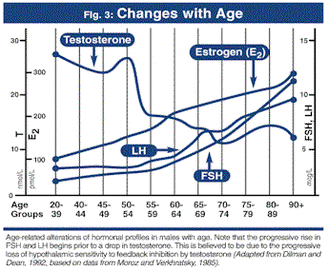As men age, their bodies undergo a series of hormonal changes that can have significant impacts on their overall health and well-being. These changes can affect various aspects of their physical, mental, and sexual health. In this article, we will explore the most common hormonal changes that occur in men as they age and discuss the potential effects they may have.
The Aging Process and Hormonal Shifts
The aging process is natural and inevitable. With age, men experience a gradual decline in their hormone levels, including testosterone, which is the primary male sex hormone. Testosterone plays a crucial role in maintaining muscle mass, bone density, sex drive, and overall vitality. As men age, their testosterone production decreases, leading to hormonal imbalances.
Physical Changes
One of the most noticeable physical changes that occur with hormonal shifts in men is a decrease in muscle mass and an increase in body fat. As testosterone levels decline, the body’s ability to build and maintain muscle diminishes. This can result in a loss of strength and reduced physical performance.
In addition, hormonal changes can also impact bone health. Testosterone helps stimulate the production of new bone tissue, so a decline in testosterone levels can lead to decreased bone density and an increased risk of osteoporosis.
Mental and Emotional Effects
Hormonal changes can also impact men’s mental and emotional well-being. Testosterone plays a crucial role in regulating mood, energy levels, and cognitive function. As testosterone levels decline, men may experience symptoms such as fatigue, irritability, mood swings, and difficulty concentrating.
It is important to note that these changes can vary from person to person, and not all men will experience these symptoms to the same extent. However, they are worth considering as part of the aging process and seeking appropriate support if necessary.
Sexual Health
Another significant area affected by hormonal changes in men is sexual health. Testosterone is essential for maintaining a healthy sex drive (libido) and supporting erectile function. As testosterone levels decline, men may experience a decrease in sexual desire, difficulties with achieving or maintaining erections (erectile dysfunction), and a decline in overall sexual satisfaction.
Fortunately, there are various treatment options available for men facing challenges with sexual health due to hormonal changes. Hormone replacement therapy and other interventions can help restore hormonal balance and alleviate these symptoms.
Dealing with Hormonal Changes
While hormonal changes are a natural part of the aging process, there are certain lifestyle modifications that men can adopt to manage their effects:
Regular exercise: Engaging in physical activity can help maintain muscle mass, improve bone density, and boost testosterone levels.
Healthy diet: Consuming a balanced diet rich in nutrients can support overall health and hormone production.
Stress management: High levels of stress can negatively impact hormone levels. Finding effective stress management techniques, such as meditation or yoga, can be beneficial.
Seeking medical advice: If the symptoms of hormonal changes significantly affect quality of life, seeking medical advice from a healthcare professional is vital. They can provide appropriate guidance and potential treatment options.
The Bottom Line
Hormonal changes are an inevitable part of the aging process in men. These changes can impact various aspects of their physical, mental, and sexual health. Understanding these changes and seeking appropriate support if necessary can help men navigate this phase of life with better wellbeing and quality of life.




